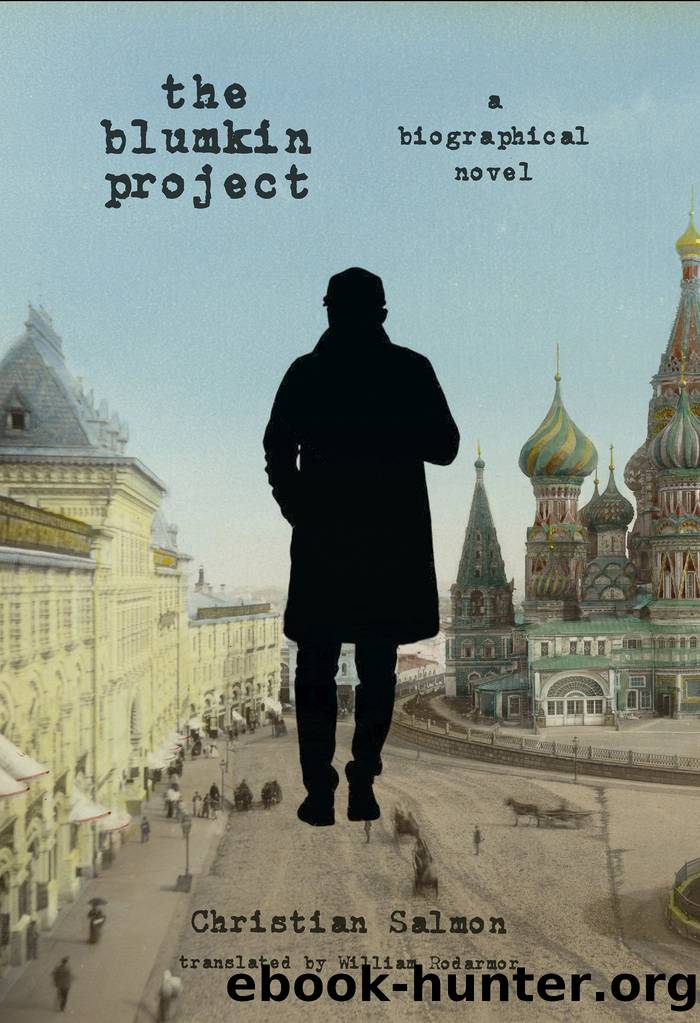The Blumkin Project by Christian Salmon

Author:Christian Salmon [Salmon, Christian]
Language: eng
Format: epub
Publisher: Other Press
Published: 2022-09-27T00:00:00+00:00
* * *
â
In the Russian Civil War, 1919 was a pivotal year. For the first six months, White Armies encircled the Sovietsâ republic, threatening Petrograd and Moscow. Fighting had destroyed the countryâs industrial infrastructure. Natural resources were drying up, and the occupation of Baku deprived the Bolsheviks of the oil that is essential to a wartime army. The cars that Bolshevik commissars drove ran on a mix of turpentine and alcohol. Lacking kerosene, airplanes filled up with a pharmaceutical mixture concocted by chemical engineers. Pistons and connecting rods were lubricated with castor and cotton oils. Marine diesel fuel was rationed, and steam engines were fed dead fish and animal carcasses.
The White Armies led by Denikin, Kolchak, Yudenich, and Wrangel were gaining ground everywhere, backed by the French in the south and west, and by the English in the north and the Urals. The French supported Pilsudskiâs Polish troops and Denikinâs army in the Caucasus and the Black Sea coast. The British supported Yudenich and Kolchak in the Urals. Denikinâs soldiers occupied Baku. The Reds lost Kharkov on June 24, and Ekaterinoslav on June 27. Tsaritsyn (the future Stalingrad, the âRed Verdunâ) fell under pressure from British artillery and air strikes.
Denikin launched the White Armiesâ big offensive on July 3, making no secret of his objective. âWe were already choosing which horses we would ride for our triumphant entrance into Moscow,â remembers a British lieutenant who served under Denikin.
The intervention by Allied armies in Russia would reach its greatest intensity in 1919. By the summer, few people were betting on Leninâs survival. Newspapers in New York, London, and Paris announced Red Army defeats daily. Whether true or not, the reports lent credence to the promise of an imminent victory over Bolshevism.
Every Western government had its wartime hawks, but Winston Churchill, the United Kingdomâs young secretary of state for war, was one of its most rabid. Even Prime Minister Lloyd George was concerned: âHe is obsessed by Bolshevism, and absolutely wants to go fight in Russia.â The British press, most of which opposed intervention, spoke of âMr. Churchillâs personal war.â But Winston stuck to his guns. To the prime minister, who listened with alarm, he declared, âOf all the tyrannies in history, the Bolshevist tyranny is the worst, the most destructive, and the most degrading.â In the House of Commons he proclaimed, âBolshevism is not a policy; it is a diseaseâ¦Civilization is being completely extinguished over gigantic areas, while Bolsheviks hop and caper like troops of ferocious baboons amid the ruins of their cities and the corpses of their victims.â He called them âa league of failures, the criminals, the morbid, the deranged and the distraughtââ¦sustained by âtyphus-bearing vermin.â
In fighting that âvermin,â Churchill wanted to pull out all the stops. Researchers at the Porton Down military laboratory had just perfected a secret weapon dubbed Device M: a shell that released a toxic gas derived from arsenic when it exploded. It was intended for use against the rebellious tribes of northern India. The general in charge of its development called it âthe most effective chemical weapon ever devised.
Download
This site does not store any files on its server. We only index and link to content provided by other sites. Please contact the content providers to delete copyright contents if any and email us, we'll remove relevant links or contents immediately.
Down the Drain by Julia Fox(981)
The Light We Carry by Michelle Obama(900)
Cher by Cher(798)
Simple Passion by Annie Ernaux(747)
Love, Pamela by Pamela Anderson(606)
The Nazis Knew My Name by Magda Hellinger & Maya Lee(579)
Zen Under Fire by Marianne Elliott(565)
You're That Bitch by Bretman Rock(551)
Novelist as a Vocation by Haruki Murakami(543)
Alone Together: Sailing Solo to Hawaii and Beyond by Christian Williams(533)
The Foxfire Book of Appalachian Women by Kami Ahrens(531)
Kamala Harris by Chidanand Rajghatta(497)
Gambling Man by Lionel Barber(490)
The Barn by Wright Thompson(440)
Drinking Games by Sarah Levy(430)
A Renaissance of Our Own by Rachel E. Cargle(418)
Limitless by Mallory Weggemann(417)
A new method to evaluate the dose-effect relationship of a TCM formula Gegen Qinlian Decoction: âFocusâ mode of integrated biomarkers by unknow(416)
Memoirs of an Indian Woman by Shudha Mazumdar Geraldine Hancock Forbes(415)
